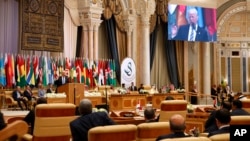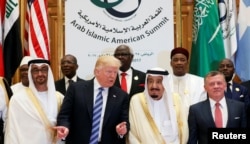Many Muslims around the world reacted positively to U.S. President Donald Trump's speech Sunday to dozens of Arab and Muslim leaders at the Arab Islamic American Summit in the Saudi capital Riyadh. There, Trump called for Muslim unity in the fight against terrorism.
During the 2016 presidential campaign, Trump had called for a “total and complete shutdown” of Muslims entering the U.S. But Sunday he outlined his vision for U.S.-Muslim relations and the need for Muslim countries to jointly combat terrorism, saying the fight against terrorism was "a battle between good and evil."
“President Trump gave an effective speech focusing on one of the major challenges facing the Middle East and the world: terrorism and extremism,” said Zalmay Khalilzad, former U.S. Ambassador to Afghanistan, Iraq, and the United Nations. “His call on Muslim leaders at the summit to do more to take on extremists and terrorists was important.”
The former top Muslim U.S. diplomat praised Trump’s offer to “build partnerships with Muslim majority countries to promote peace and prosperity.”
“Bravo President Trump,” tweeted Anwar Gargash, UAE’s state minister for foreign affairs. “Effective and historic speech defining approach towards extremism and terrorism with candid respect and friendship.”
Muslim leaders and analysts said the U.S.-Saudi initiative would help counter the expanding waves of extremism in the region.
“A Muslim nations -U.S. cooperation would help counter extremism and extremist groups, Siraj Wahab, deputy managing editor of the Arab News daily in Jeddah, told VOA’s Urdu service.
Buffalo University professor Faizan Haq echoed Wahab’s comments and said “President Trump talks straight and this trip on the whole will enhance the cooperation between Muslim countries and United States.”
Afghan Ambassador to Washington Hamdullah Mohib said the historic battle between good and evil cannot be won unless the world is united and acts as one.
‘Global threat’
“Terrorism is a global threat that demands a global solution, and the Afghan people and security forces have been thrust into the forefront of the fight,” Mohib told VOA’s Afghan service. “As President Trump said, 'every country in the region has an absolute duty to ensure that terrorists find no sanctuary on their soil,' and I would add that every country in the region also has a duty to cut off all financing and sponsorship for these groups.”
In his speech, Trump accused Iran of destabilizing the Middle East region. “From Lebanon to Iraq to Yemen, Iran funds, arms, and trains terrorists, militias and other extremist groups that spread destruction and chaos across the region.”
Pakistani politician Shireen Mazari tweeted that it seemed that the U.S. and Saudi Arabia have teamed up against Iran.
“After KSA King's speech & Trump's speech there can be no doubt that the KSA-led alliance is focused against Iran!”
Khalilzad said Trump should have also mentioned other factors that have contributed to the emergence of extremism in the region.
“Besides highlighting the negative role played by Iran's policies in producing extremism and terror and calling for an end to providing sanctuaries, it would have been good if the president had also focused on additional factors, especially the challenge of governance that contribute to the rise and persistence of the challenge, and reforms and changes needed to address them.”
Reacting to Trump’s speech in a tweet, Iran’s Foreign Minister, Javad Zarif, suggested that the speech was rather a business deal between the U.S. and Saudi Arabia.
“Iran - fresh from real elections - attacked by @POTUS [President Trump] in that bastion of democracy & moderation. Foreign Policy or simply milking KSA of $480B?”
Speaking with VOA’s Afghan service prior to Trump’s speech, Afghan Ambassador to Qatar, where the Afghan Taliban has a political office, said that while the Arab governments are concerned about the Islamic State group (IS) and Taliban, some wealthy Arab individuals are supporting them. “It all depends on what President Trump says to them today, to gain their full cooperation in the fight against ISIS,” Faizullah Kakar, the Afghan Ambassador said.
In Indonesia, which has the largest Muslim population in the world, Foreign Ministry spokesman Armanatha Nasir said Saturday the Riyadh meeting was important because “it is the first time a meeting between the new American government and Islamic countries [are] addressing issues that are of concern to us all, especially regarding the fight against radicalism and terrorism.” Indonesia has recently been hit by a wave of terror attacks. As many as 384 Indonesians have joined the Islamic State group, according to Indonesia's counterterrorism agency.
“Indonesia will convey our experience and the steps we have taken in the fight against terrorism and radicalism. How we use soft power and hard power approach in combating radicalism and terrorism."
Robertus Robet, an Indonesian analyst, believes the speech indicates the U.S. no longer wants to be at the forefront of the war on terrorism.
"America will play a supportive role and the countries in the Middle East are front-line in the so-called 'good and evil, war," Robet told VOA. "Whether later will be realized in the form of a policy where American troops are no longer in the front lines, and diplomacy plays a bigger role in the future, we will have to see."
Possibility of ‘reset’
Some Muslim analysts said the speech would help Trump hit a reset with the Muslim world.
“The soft tone and positive narrative in Trump’s speech would help eliminate the reservations of Muslims about his narrative during the election campaign,” journalist Wahab said.
As a candidate, Trump proposed temporarily banning Muslims from entering the United States which led to a strong condemnation by Muslims in the U.S. and around the world. Analysts say that Sunday’s speech will present a softer image of Trump in the Muslim world. As president, he ordered temporary bans on people from certain Muslim-majority countries, which have been blocked by courts that ruled they were discriminatory.
In Turkey, the opinion remained divided.
“Some of them [Turks] think that Trump picked Saudi Arabia for his first foreign visit to make up for his anti-Muslim stance in the campaign period and also his executive orders to limit travels of some Muslim countries' citizens,” Ilter Turan, a political science professor at the Istanbul Bilgi University, told VOA’s Turkish service. “Others think that Trump still doesn't like Muslims but pretend that he likes because of trade agreements and interests.”
Some analysts, however, are skeptical if Trump would be able to effectively execute his vision as he faces many domestic challenges.
“The question is, can president Trump fulfill the promises he made during his visit and the speech?” asked Bilal Wehab, a fellow at the Washington Institute for Near East Policy. “The answer depends on how Trump will solve his internal problems in Washington, D.C.”
But Dhaka-based Bangladeshi journalist, Mizanur Rahman Khan, believes that Trump’s speech was indicative of “a new angle about how America looks forward to the Muslim World and certainly a departure from earlier perceptions.”
VOA’s Afghan, Bangla, Deewa, Indonesian, Kurdish, Turkish and Urdu Services contributed to this report.





